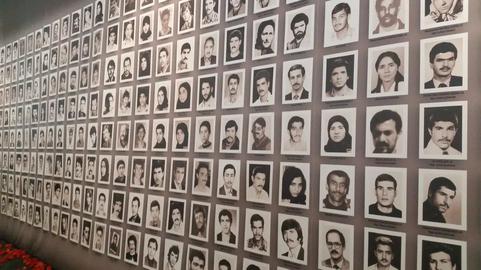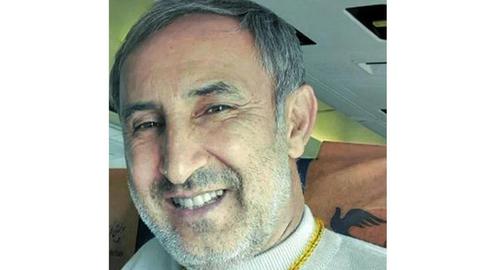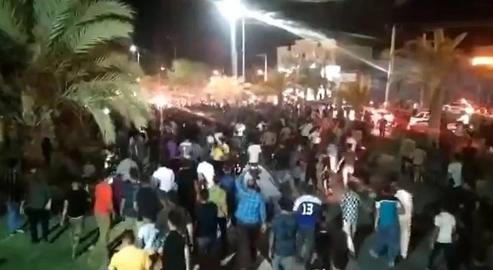In a week’s time, the trial of former Iranian prison official Hamid Nouri will formally open in Stockholm, Sweden. The landmark court case will be the first time anyone has been prosecuted over the 1988 massacre of political prisoners in Iran.
In-person hearings are due to begin in Stockholm District Court on Tuesday, August 10 and continue until April 2022. The sheer volume of witness testimonies is such that Nouri, who was a prosecutor’s assistant in Gohardasht Prison at the time of the atrocity and is said to have had a role in the killings, is unlikely to put forward a defense until around November.
Swedish public prosecutor Kristina Lindhoff Carleson, who brought the case against the 60-year-old together with colleague Martina Winslow, told IranWire that since Nouri’s arrest in November 2019 they had interviewed 94 people in connection with the killings of thousands of Iranian prisoners that summer.
About 70 of these are due to take the stand in the coming months. A few may testify via video-link. They include ex-prisoners and the families of people who were killed, as well as experts on the political and religious environment in Iran at the time. Others who felt unable to testify in open court because of safety concerns have been removed from proceedings.
“This will be a unique trial,” Lindhoff Carleson, who previously brought an individual to justice in Sweden for their part in the 1994 genocide of Tutsis in Rwanda, told IranWire. “But when a case comes to us, we have to look at it through a prosecutor’s eyes.
“In the beginning, we saw some evidence that made it possible for us to start an investigation. That then became more and more substantial. People were talking about horrifying things.”
At the end of the Iran-Iraq war, thousands of prisoners in Iran were taken to be systematically slaughtered – mostly by hanging and firing squad – by prison officials on the orders of Ayatollah Khomeini.
The first “wave” from July focused on members of resistance movement the Mojahedin-e Khalq Organization (MEK). At least 1,500 people were sent by prison “death panels” to be killed in a matter of weeks. Then after Muharram, prison officials began executing other jailed members of leftist groups based on their perceived adherence to Islam.
As a senior official overseeing Gohardasht Prison at the time of the massacre, Nouri is instead charged with war crimes in relation to the killings of MEK members, and with murder over the killings of other leftist prisoners. The first people to give evidence in August, Lindhoff Carleson said, will be those that the prosecutors regard as victims: both ex-prisoners and the relatives of some of the Iranians who were killed.
Awakening the World to the Crimes of 1988
On Saturday, activist network the Committee in Solidarity with the People's Struggle in Iran hosted an online discussion about the potential ramifications of the trial. The Hamid Nouri court file, attendees were told, now runs to more than 8,000 pages.
Iranian-born lawyer Shirin Ebadi, who received the Nobel Prize for Peace in 2003, said the indictment of Nouri in a third country served as a reminder that certain types of serious crime have no statute of limitation under international law. “In a hundred years’ time, if any of these perpetrators and commanders were caught, they could be prosecuted,” she said.
Shahla Shafiq, a writer, sociologist and women's rights activist, said she observed a pattern in recent litigation against the Iranian regime in third countries, such as the upcoming Aban Tribunal in London and a recent civil case against Iran for the downing of Flight 752 in Canada. “Today,” she said, “the entire Iranian nation is a plaintiff.”
She also described Hamid Nouri’s trial as a “new leaf” in Iranian history – one that would irrevocably refute the Islamic Republic’s decades-long official denial that crimes took place that summer. From Khuzestan to Tehran, the desire for water, bread and freedom is intertwined."
As far as some of those present were concerned, the fact of the trial happening at all was of greater import than what the outcome might be. Writer and researcher Nasser Mojaher said: “We don’t know how Hamid Nouri will conduct himself in court, or how his lawyer will defend their client. But the witnesses who testify may awaken the world’s conscience to one crime against humanity, and to one of the deep, open wounds in our society.”
The first hearing against Hamid Nouri in Stockholm District Court will also take place within days of the inauguration of Ebrahim Raisi as President of Iran. Raisi sat on the four-member “death panel” that sent hundreds, if not thousands, to their deaths in Tehran in the summer of 1988.
Whether Ebrahim Raisi could face also prosecution, as a sitting president, would depend on individual states’ interpretation of international law. But as Ebadi pointed out, even if he is regarded as having immunity for the next four to eight years, “The message of this case is: Those involved in spilling the people’s blood, you won’t be allowed to sleep well.”
Related coverage:
Hamid Nouri to Face Trial for War Crimes in Sweden Over 1988 Massacre of Iranian Prisoners
Iranian Ex-Prisoners Recall 'Courier of Death' Hamid Nouri Ahead of Sweden Trial
Justice at Last? 1988 Massacre Suspect Arrested in Sweden
A Move For Justice Around the World
Raisi's Crimes Against Humanity Will Haunt his Presidency
1988: The Crime that Won't Go Away
Ebrahim Raisi: The Case for the Prosecution
Fresh Calls for Mousavi to Face Criminal Investigation Over 1988 Massacre
visit the accountability section
In this section of Iran Wire, you can contact the officials and launch your campaign for various problems



























comments